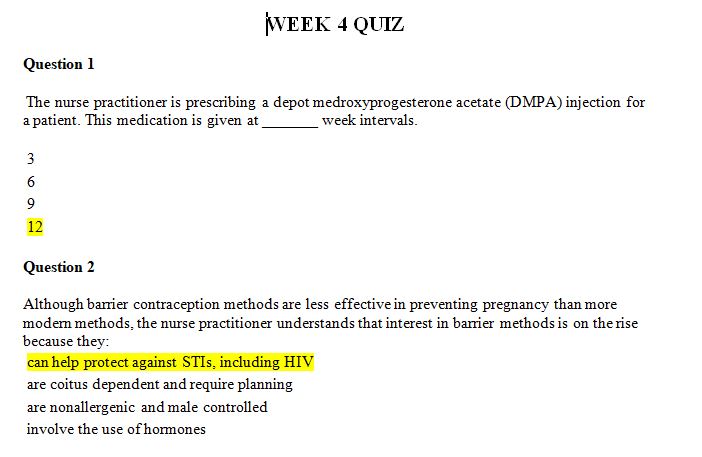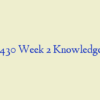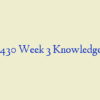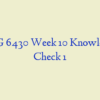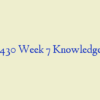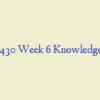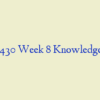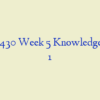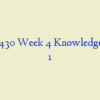Description
NSG 6430 Week 4 Knowledge Check
- The nurse practitioner is prescribing a depot medroxyprogesterone acetate (DMPA) injection for a patient. This medication is given at _______ week intervals.
- Although barrier contraception methods are less effective in preventing pregnancy than more modern methods, the nurse practitioner understands that interest in barrier methods is on the rise because they:
- A woman is interested in starting Depo-Provera injections for contraception. What would be the most likely side effect that she should be educated about?
- Lenore, fifty-five years old, comes in for evaluation of a breast mass. Which of the following assessment findings is/are associated with carcinoma of the breast? Select all that apply.
- There are several phases to the menstrual cycle. What phase begins with ovulation and ends with menstruation?
- Tanisha is a twenty-two-year-old woman who presents with extreme irritability and mood swings, bloating, constipation, fluid retention, and headache. She tearfully tells you, “This happens every month in my cycle. I get like a crazy woman, lashing out at everyone. I’m afraid I’ll lose my job if I can’t stop this. Sometimes, it’s so bad. I just want to quit living. I need help!” Tanisha’s symptoms are typical of what disorder?
- Sylvia is a forty-four-year-old woman with abnormal uterine bleeding (AUB) and is unable to use combined hormonal oral contraceptives. Which of the following medications can be used for management of AUB?
- Your fifteen-year-old patient has been diagnosed with secondary amenorrhea. The urine human chorionic gonadotropin (HCG) is negative and Prolactin levels are within normal limits. The physical examination reveals growth of breast tissue and Tanner stage III. Which of the following medication regimes would be most appropriate?
- A female patient has been …..with polycystic ovary syndrome (PCOS) and weighs 250 pounds. In addition to obesity, PCOS is …..with which of the following clinical manifestations? Select all that apply.
- The nurse practitioner is counseling an eleven-year-old girl, Kayleigh, and her mother about the human papillomavirus vaccine (HPV), Gardasil. Kayleigh is Tanner stage IV at this visit. In counseling this family, the nurse practitioner tells them that the HPV vaccine ______.
- The nurse practitioner understands that women with polycystic ovarian syndrome have an increased risk for:
- The nurse practitioner is instructing a patient on the proper use of the diaphragm, a barrier contraceptive method. Which of the following would the nurse practitioner include in the instructions?
- Abnormal uterine bleeding (AUB) has multiple causes. When a woman presents and reports menstrual irregularity with amenorrhea, which is the most common cause of amenorrhea?
- Polycystic ovaries predispose women to a higher incidence of:
- A well-woman visit for an adolescent should include which of the following? Select all that apply nsg 6430 week 4 quiz
- A 42-year-old female presents to your office with complaint of a palpable breast mass that she noticed while performing her breast self-examination. After taking her history, you perform a clinical breast examination which reveals a solitary, 3 cm, mobile, non-painful, rubbery mass. On the basis of her clinical breast examination, what is most likely her diagnosis?
- Which of the following contraceptives would not be a reasonable method for a 40-year-old patient that smokes 1 pack of cigarettes per day and has a history of hypertension?
- The nurse practitioner is counseling a patient on the proper use of the vaginal contraceptive ring. Which of the following statements is true?
